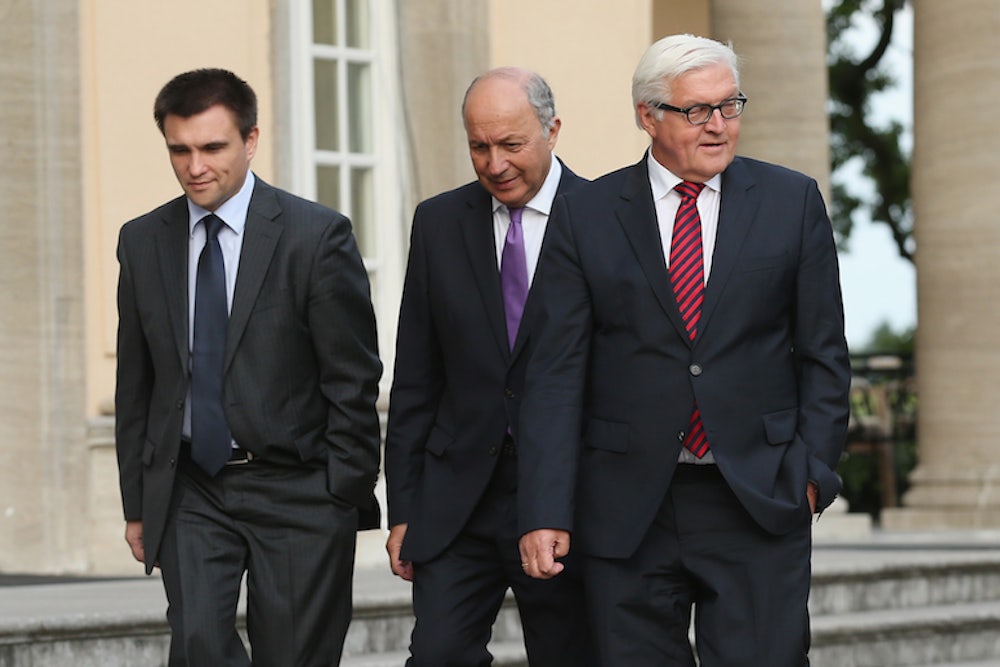Before Sunday's four-party talks in Berlin began, Ukrainian Foreign Minister Pavlo Klimkin tried to sample local European fare. He soon came across a menu item called “Baked Potato Paris-Moscow,” which comes with salad, smoked salmon, and dill mustard sauce, according to his Twitter feed. “Such is the proximity: From warships and amusement parks to baked potatoes,” Klimkin observed.
He was referring both to France’s agreement to deliver two Mistral warships to Russia (and to teach the Russian army how to build its own), and to a deal French politician Philippe de Villiers recently cut with Putin that allows Mr. de Villiers’ company to build two “historic” theme parks in Crimea and Moscow. The parks will “promote the history of Crimea as part of the long history of Russia," Villiers, who is a sitting member of the European Parliament and former presidential candidate, said on Saturday (he also said he “would gladly swap Hollande and Sarkozy for Putin”).
Despite increased sanctions, Russia has hardly felt ostracized by European leaders for its actions in Ukraine (as much is evident from the Russian foreign ministry’s coverage of yesterday’s talks, during which a member of the Russian delegation reportedly made “inappropriate jokes” about the situation). So it is wholly unsurprising that yesterday’s talks between the French, German, Ukrainian, and Russian foreign ministers failed to produce any semblance of an agreement with regard to the crisis in Ukraine. German Foreign Minister Frank-Walter Steinmeier had been hoping for "a roadmap toward a sustainable ceasefire,” including an agreement to stop the flow of arms and rebel fighters into Ukraine, Deutsche Welle reports. No such progress was made in Berlin. “We are not able to report on positive results on reaching a ceasefire and on [a start to] the political process [to resolve the conflict],” Russian Foreign Minister Sergei Lavrov told reporters.
At least this time they were honest. This is not their first Berlin summit; the foursome previously met at the start of July, when Steinmeier triumphantly reported that they had agreed upon "a clear commitment to a multilateral ceasefire.” That was when Russia was “continu[ing] to provide [rebels] with heavy weapons, other military equipment and financing, and continues to allow militants to enter Ukraine freely,” as the State Department put it. Moscow-approved rebel leaders were in charge of the separatist republics, and the Ukrainian military had yet to make meaningful gains in eastern Ukraine.
But now that Ukraine’s relentless “anti-terrorist operation” in the east has allowed Ukrainian forces to retake large swathes of rebel territory and the separatist leadership has seemingly disintegrated, Russia is proving increasingly unwilling to negotiate; defeat is not an option. Lavrov went so far as to suggest that Ukraine return to the February 21 agreement signed by former President Viktor Yanukovych, which called for presidential elections, constitutional reform, and weakened presidential power—an agreement that Russia refused to sign. “Two days after signing it, the agreement was torn up, a coup was mounted, and a ‘government of winners’ was announced,” Lavrov said, referencing Ukrainian Prime Minister Arseniy Yatsenyuk’s term for the new government. “National unity and the winners vs. the defeated. This is where the problem lies that keeps causing new tragedies in Ukraine.”
In that, Lavrov is precisely right: Now that the separatists are losing ground, Russia has become even more brazen in sending arms and fighters across the border, and, apparently, in undermining any prospective diplomatic solution. As Ukrainian forces continue to push into rebel territory, they may finally, finally force Putin’s hand, compelling Russia to send the 17 battalions of “peacekeepers” it has clustered at the border into Ukrainian territory. “It’s a case of being very, very, very careful what you wish for,” the Eurasia Group’s Cliff Kupchan told The New York Times, adding that if, in fact, “the rebels are about to get routed, we do have a problem.”
